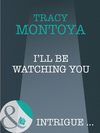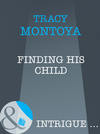Loe raamatut: «I'll Be Watching You»
“I’m with you till the end, Adriana. However long it takes until we catch him.”
But there could be another end to this story—she knew that better than anyone.
“I’ll keep you safe. I swear.”
“What about the cop who tried to protect me the last time?”
His mouth quirked upward in the crooked half smile she was starting to recognize. “Nothing’s going to make me leave your side.”
Oh, my.
“Okay.” She barely realized she’d agreed to his protection until the word shot out of her mouth, against her better judgment. He didn’t deserve to be involved in this. He didn’t deserve to die because of her.
As if he could read her thoughts, something softened in his deep hazel eyes. He reached up to trace her jawline with his hand, making the barest contact with her skin. It stole her breath all the same….
I’ll Be Watching You
Tracy Montoya

To Kim Fisk. You earned this one with all of those blitz
critiques I made you do! I’m blessed to have you for a friend.
ABOUT THE AUTHOR
Tracy Montoya is a magazine editor for a crunchy nonprofit in Washington, D.C., though at present she’s telecommuting from her house in Seoul, Korea. She lives with a psychotic cat, a lovable yet daft I has a apso and a husband who’s turned their home into the Island of Lost/Broken/Strange-Looking Antiques. A member of the National Association of Hispanic Journalists and the Society of Environmental Journalists, Tracy has written about everything from Booker Prize–winning poet Martín Espada to socially responsible mutual funds to soap opera summits. Her articles have appeared in a variety of publications, such as Hope, Utne Reader, Satya, YES!, Natural Home and New York Naturally. Prior to launching her journalism career, she taught in an under-resourced school in Louisiana through the AmeriCorps Teach for America program.
Tracy holds a master’s degree in English literature from Boston College and a BA in the same from St. Mary’s University. When she’s not writing, she likes to scuba dive, forget to go to kickboxing class, wallow in bed with a good book, or get out her guitar with a group of friends and pretend she’s Suzanne Vega.
She loves to hear from readers—e-mail TracyMontoya@aol.com or visit www.tracymontoya.com.
CAST OF CHARACTERS
Adriana Torres —Four years ago, Adriana’s fiancé was killed in the line of duty while hunting serial killer Elijah Carter. Now someone is leaving her mysterious threats, and dredging up all of her long-buried painful memories.
Daniel Cardenas —The Monterey police detective is determined to keep Adriana safe from the stalker whose threats seem to be escalating—even while she’s determined to shut him out.
Elijah Carter —A vicious serial killer whose struggle with police and FBI resulted in his falling into the dangerous waters lining Monterey Bay. His body was never found.
Stan Peterson —Adriana’s yoga student seems to have an unhealthy interest in his teacher.
James Brentwood —The Monterey police detective—and Adriana’s fiancé—was shot and killed by Elijah Carter.
Liz Borkowski —Daniel’s no-nonsense partner and Adriana’s friend, Detective Borkowski well remembers Elijah Carter, because she almost died under his knife.
A.J. Lockwood —The veteran detective knows Elijah Carter’s killing methods well—and he’s convinced Carter survived and is back to kill again.
Sean Cantrell —Could Adriana’s teenage neighbor be behind the threats left at her door?
Contents
Prologue
Chapter One
Chapter Two
Chapter Three
Chapter Four
Chapter Five
Chapter Six
Chapter Seven
Chapter Eight
Chapter Nine
Chapter Ten
Chapter Eleven
Chapter Twelve
Chapter Thirteen
Chapter Fourteen
Chapter Fifteen
Prologue
Stifling a yawn with his fist, Detective Daniel Cardenas wondered not for the first time what the hell he was doing up at oh-dark-hundred in the morning, several hours before his shift was supposed to start. His dashboard clock read 3:07 a.m. as he maneuvered his unmarked Crown Victoria slowly through the gauntlet of blue-and-whites lining East Alvarado Street, their flashing lights creating an eerie, pulsing red halo around the small neighborhood. It was normally considered one of Monterey, California’s, “safer” areas.
Not tonight, obviously.
When his partner had called him down here, she hadn’t bothered to give him any details. But something in her normally no-nonsense voice had sent his cop sense into overdrive, and he knew it was shut-up-and-go time. So he shut up, hung up and went. All without his usual morning jolt of caffeine.
God, he would have sawed off his right arm for some coffee.
Pulling his car alongside the curb, about a block away from the small shotgun-style bungalow at the center of all the activity, Daniel got out and made his way back toward 447 East Alvarado. Radio chatter had indicated a homicide had taken place, and from the fact that every cop in the metro area and then some seemed to be parked on this one street, it wasn’t going to be a pretty one.
He walked under a streetlight, and the sudden brightness of its tungsten lamp shining down upon him made his head throb. Ahead, some neighborhood residents huddled together in a tight, worried-looking group, occasionally craning their necks or shuffling from side to side to see what was going on. Unfortunately for them, an ambulance with two very jittery-looking EMTs leaning against it blocked their view. As if sensing his approach, one of the women onlookers turned around and broke away from the group when she saw him.
“Excuse me,” the woman said, tightly clutching the lapels of her ratty red bathrobe together with one hand. “Are you with the police? Because I didn’t know the girls who lived there well, but…”
“Ma’am, at this point, I don’t know any more than you do,” he said politely. “But—”
“It’s our right to know,” she said, falling into step beside him. “Our taxes pay your salary, young man. I won’t—”
Without breaking his stride, Daniel slanted a cool look at her.
“Oh, well, I—” Patting her hair, she scurried back among her friends, the rest of her statement hanging unfinished in the air. He wasn’t allowed to dole out any information to people who weren’t next of kin this early in the game. And he definitely wasn’t spilling his guts to the neighborhood gossip at any point. They were pretty much the only ones who tried to play the we-pay-your-taxes card.
Then again, if she’d come at him with a double-shot espresso, he might have been persuaded to make something up on the spot.
As he approached the yellow tape that cordoned off the scene, a street cop strode across the front yard to meet him, backlit by one of the homicide squad’s portable spotlights. Daniel flashed his badge, then ducked under the tape without waiting for the guy’s blessing. As expected, the uniform gave him a curt nod and backed off.
“Cardenas!” A. J. Lockwood, a seasoned detective who’d been with the MPD since the beginning of time, bounded down the home’s front steps and crossed the yard to Daniel. Judging from his expression, whatever was inside was going to be bad. Generally, the grislier the scene, the blacker Lockwood’s dark sense of humor became. But tonight the man’s ever-present sardonic grin was nowhere in sight.
Not a kid. Please don’t let it have been a kid.
“Janie Sanchez, graduate student at the Language Institute,” Lockwood said in greeting, not even bothering with normal pleasantries like “hello” or “you look like hell.”
“She’s our homicide?” Daniel asked.
“Oh, yeah.” Lockwood’s square jaw clenched and worked, but instead of launching into a description of the scene, he merely narrowed his flinty gaze at Daniel. “So what do you look so chipper for? I’ve been up for an hour now, and I still feel like hell. Borkowski says she got ahold of you, like, two minutes ago, and you look as if you were lying in bed in that suit, waiting for someone to call.”
Truth was he felt about as chipper as a pile of roadkill. An uncaffeinated pile of roadkill.
Then again, he’d long ago realized that what was going on inside his head didn’t often show up on his face, whether he realized it or not.
“Who’s that over there in the bushes?” Daniel asked, jerking his head toward the cop bent over the shrubbery a few feet away, making the most god-awful noises.
“Rookie. He’s been yakking all over the place since he got here.”
Great, one of those cases. “That bad?”
Lockwood gave a small grunt that would have been a short laugh under normal circumstances. “Worse. I felt like yakking. Don’t tell anyone.” He glanced back at the house’s open doorway, which was blocked by a short, stocky uniform who looked like a human fireplug, standing guard. Someone had drawn the curtains inside.
“It’s…” Lockwood blew out a long, slow puff of air. “Damn, Cardenas, I think he’s back.”
With that one sentence, the fatigue Daniel felt abruptly vanished. There was only one “he” in their shared history on the force—maybe even in the history of the entire city—that could make a rookie lose his breakfast and put the fear of God into a veteran like Lockwood.
Impossible.
Pushing past Lockwood without so much as a goodbye, he propelled himself through the small mass of his colleagues milling around outside, past the cluster of EMTs standing around with nothing to do. Taking the three front steps in two strides, he entered the house, all but ignoring the crime-scene techs taking flash photographs in the front sitting room as he followed the noise to the living room in the middle.
The few detectives in the room parted like the Red Sea when he entered, revealing his grim-faced partner standing over a body. Detective Liz Borkowski looked up as he approached, her normally pale, Irish-and-Polish complexion gone as white as bone.
“Five-point ligature marks on the ankles, wrists and neck,” one of the crime-scene techs murmured from a few feet away, obligingly describing the horror in the room to another tech who held a video camera.
Janie Sanchez’s body lay sprawled out on a blood-soaked rug in front of the living room’s brick fireplace. She’d been deliberately posed in a demeaning, spread-eagle fashion, her head tilted to the side, giving her the look of a broken marionette. Her glassy, unseeing eyes stared at something beyond the ceiling.
He’d seen this all before. He could have described the scene to the crime lab’s video camera with his eyes closed.
Because he still dreamed about the others. They all did.
“…fishing line still wrapped around the victim’s ankles and wrists…” The tech’s monotone was the only sound in the room besides everyone else’s breathing. “…defensive wounds on her hands…”
The vulnerable, taut skin on Janie’s bare stomach had been carved through repeatedly with a knife that had left her abdomen raw and mutilated.
Somebody’s sister. Somebody’s daughter.
“…multiple lacerations on her body, concentrated mostly on her abdominal area, where they appear to be in a gridlike pattern…”
Detach. He had to forget about who she’d been, and focus on who had killed her.
But how did you tell someone their daughter, their sister, their friend and neighbor had been killed by a ghost?
A ghost that hadn’t walked for four years.
Where’ve you been, Elijah Carter?
The newspapers had come up with a more colorful name for the man who’d stalked and killed eleven women, who’d crossed the country from Louisiana and California, escalating until the last few had died not mercifully or quickly, but a long, slow, torturous death he wouldn’t have wished on the worst of criminals. They called him The Surgeon. Because he liked to carve up women in his special, singular, painstaking way.
Daniel refused to call him that. Whatever he was, he was still just a man.
A man who’d apparently risen from the dead.
He crouched down beside Janie and found himself staring at one of her hands. Her slim fingers curled slightly upward, tipped with bubblegum-pink, carefully tended nails that were now caked with blood. Her wrists were red and swollen from where he’d tied them.
He looked at her face. She’d been a pretty girl.
Somebody’s sister. Somebody’s daughter.
“Who found the body?” he asked Liz, as she knelt down beside him.
“Roommate,” she said, her voice slightly hoarse. “She’s outside.”
“…multiple lacerations to the abdomen, cuts most likely made with a serrated-edge blade,” the tech droned on.
Serrated edge. Because Elijah Carter liked to rip, not slice.
“What do you think, Liz?” he asked quietly, and every person in the room strained to hear his partner’s answer. Along with Lockwood, the two of them had been on the special FBI-Monterey PD task force four years ago that had cornered Elijah Carter on the rock-strewn shores of the Pacific Ocean. They’d been down this damn road before.
Something small and vulnerable flickered across his partner’s face. She was probably thinking of her own daughters, one just a couple of years younger than Janie Sanchez.
“Copycat.” She lifted her head to look him square in the eye. “Unofficially speaking.” She pointed with a latex-gloved hand to the victim’s torn-up stomach. “Carter used to carve a very precise grid into his victims. Three lines down, four across.”
She would know.
“This victim has four lines down, four across. And that’s not the only thing that’s off.” Borkowski bent down to trace a finger gently along the vicious bruising across the young woman’s neck.
“That looks as if someone strangled her with a strap of some sort,” Daniel said, crouching down on the other side of the body. “Carter liked to use his hands.”
“Exactly.”
“Signatures can change over time, Borkowski. Sure we have some variation, but the overall theme is still there.”
Signatures were behaviors that went beyond what was necessary to commit a crime, and fulfilled a killer’s twisted psychological needs. Repeatedly strangling his victims and reviving them was one of Carter’s signature behaviors. Cutting that grid into her abdomen was a signature behavior. He’d changed things up a bit, but it still might be Elijah Carter. Or, as Borkowski obviously hoped, it might not.
“The M.E. will have to tell us for sure, but I think she may have been sexually assaulted, too,” Liz said. “Carter never did that. That would change his MO. Which just doesn’t happen.”
Daniel made a point to keep his focus steady on the contusions on Janie Sanchez’s neck. It seemed like another violation to look at the rest of her body while having this discussion.
“Dammit, Cardenas, it has to be a copycat.”
He jerked his head up in surprise—his tough-as-nails partner never let her emotions show. Not like that—imposing her own interpretation on a crime scene because she couldn’t bear to think of the alternative.
She didn’t meet his eye, instead rising from the ground. Squaring her shoulders, she came back to herself and started barking orders. She swept from the room, and everyone else hustled to comply with her commands, obviously relieved to have something to occupy their too-busy minds.
As Daniel rose, Lockwood approached him.
“Up until 1905, it was legal in China to execute someone for a capital offense by lingchi , or the ‘death of a thousand cuts,’” Lockwood murmured as he, too, stared down at the body.
Daniel knew what he was talking about. The ancient form of capital punishment was reportedly as gruesome as the name suggested, with the executioner inflicting multiple nonlethal cuts all over the victim’s body, prolonging death until said victim finally expired from his cumulative wounds.
“Janie Sanchez died of a thousand cuts,” Lockwood continued. “Borkowski might want to insist it’s a copycat, but I don’t know…I’ve never seen another man who did that to his victims.”
Chapter One
Hustling out the door on her way to work, Adriana Torres caught a glimpse of something out of the corner of her eye that stopped her in her tracks. Her keys fell out of her suddenly slack grip, jangling loudly as they hit the ground.
A nasty-looking hunting knife protruded from her home’s siding. Pinned to the wood by the sharply gleaming steel was a folded slip of paper. She didn’t need to read its contents to know that the message would be very concise and very disturbing.
“Nice.”
Some people’s neighbors said good morning to each other as they started their day. Hers jabbed knives into her house. And por el amor de Dios, what had her house ever done to them?
Rolling her eyes heavenward and muttering a brief prayer for patience in Spanish, Addy grabbed hold of the handle, giving it a good tug. When it didn’t come out on the first try, she dropped her tote back on her front stoop with a thud and tried again with both hands until the knife chunked free.
She didn’t bother to glance around her quiet street, figuring it was hardly worth it to muster up the energy to be annoyed anymore. As one of the neighborhood dogs started up a faraway, staccato bark, she examined the latest addition to her growing collection of cutlery. It felt heavier and looked a little more expensive than usual.
Whatever. Maybe the idiot who’d put it there thought that spending more money would be scarier. As if.
Purposefully adopting a bored expression, just in case the nasty little twerp was watching, she picked up her keys and dropped them back into her purse. She’d always hated the thought of living in a wealthy gated community, but at times like this the idea had its attractions.
Pushing the door back open with one hip, she kicked at the slip of paper that had fallen to the ground after she’d freed the knife holding it. It fluttered inside the house, and she picked up her tote and followed suit. Without bothering to pick the paper up, she headed for the phone in her kitchen. She dialed the familiar number without glancing at the list of her favorite contacts stuck to the fridge.
“Borkowski,” came a woman’s curt response.
“Hey, Liz, it’s me.” Addy leaned against the counter, a frisson of annoyance tracking up her spine as she contemplated being late to work because of a stupid prank…again. But while she and Liz both knew that none of the teenage troublemakers who lived on her block was going to slink forward and confess, she’d promised her friend she would call each and every time someone stabbed her house. “Got another note.”
“Same deal as last time?”
Addy tossed the knife on the counter. “If by that you mean, one large, ugly knife that left yet another large, ugly hole in my siding, yes. Every time Halloween comes around, it’s the prank du jour.”
Liz swore softly—which was very uncharacteristic of her—and for the first time, Addy realized that the usual sounds she heard in the background when she called Liz at the station—papers shuffling, phones ringing—weren’t present. Instead, it sounded like Liz was outside.
“Is this a bad time?” Addy asked. “You out and about doing your cop thing?”
“No, no,” said Liz, sounding somewhat preoccupied despite her denial. “I’m at a scene, but this is important.”
“After seven of these notes since…” She let her voice trail off, not wanting to think about the event that had divided her life into before and since. “I don’t think it’s all that important, Liz. The sky hasn’t fallen yet.”
The first threat had also come in October, exactly a year after the love of Addy’s life, Monterey Police Detective James Brentwood, had been killed in the line of duty while hunting a prolific serial killer—a serial killer who was now dead, thank you very much. But a bestselling book about the case had made her little corner of the city rather notorious, since the killer known as The Surgeon had drowned just a few yards away from Addy’s home in an FBI-Monterey PD undercover operation.
And suddenly the kids in her neighborhood had found it amusing to leave notes on her door, pretending to be the resurrected killer of her beloved fiancé by mimicking his favorite way of terrorizing his intended victims.
Sometimes you just had to wonder what was wrong with people.
The first time, the message had terrified her beyond belief, coming on the grim anniversary as it had. Then, more notes came, and they were always the same—someone would leave a cheap knife embedded in her wooden door, along with a childishly scrawled note saying he was “coming for” her.
So she’d bought a security system and a steel front door, and the notes kept coming, until there had been so many, all they sparked in her was contempt. If someone was really out to get her, she figured they’d have done something by now, rather than simply continuing to write about it. And on one occasion, she’d seen a suspiciously gangly, teenager-looking shadow lurking about her front door when another note had appeared, which had led her and the police to believe that she was merely the target of a few young pranksters in the area with tragically inept parents.
“I’m sorry, Addy,” Liz said, breaking a silence that had stretched out for too long. It seemed as if all of her conversations did that, in the four years since James had died. “This has to be so hard on you, especially now.”
Especially now. October again. The month when she’d lost James.
Addy picked at a hangnail as she watched the cold waves of the Pacific Ocean crash spectacularly against the jagged black rocks that lined the shore outside her window. Four years. She’d gotten to the point where she could handle being left behind most days, where the intense, indescribable grief she’d felt at losing him was just a dull memory, hanging in the background of her everyday activities—always there, but something she could live with. Like Liz lived with it, although she and James had just been work partners and friends.
And then sometimes, out of the blue, it sucker-punched Addy in the stomach, leaving her gasping for air and wondering whether she’d even be able to function into the next hour, much less the next decade. And all the ones that would come after.
Too long. Too long to be without him.
She closed her eyes and breathed deeply, trying to pull herself together enough to finish the conversation, so she could hang up, call in sick and scream into her pillow until she fell into an exhausted sleep, the way she’d done too many times to count. Unfair.
Unfair-unfair-unfair-unfair-unfair….
“Addy.”
“Yeah?”
“Have you seen the news this morning?”
She shook her head, swallowing hard a couple of times before she answered so she wouldn’t sound half-strangled. “No. I don’t watch the news until after dinner. It’s not a positive way to start your day.”
“Look—” Liz exhaled sharply into the phone “—I can’t leave just now, but I’m sending someone over—”
“No.” Clenching her teeth together so hard, she thought they might crack, Addy shook her head and willed herself to function. Don’t think. Don’t feel. Put James back in the little box inside her head where she kept him, so she could interact with others like a semi-normal human being. Howling at them in grief never made for good conversation. “No.”
“Addy, I mean it, stay there.”
Grabbing a paper bag from under the sink, the phone tucked between her shoulder and chin, Addy stuffed the knife into it and headed for the door. Just before she reached it, she picked up the note from the floor and put it in the paper bag, then shoved the whole mess into her tote. “No. I’m sick of letting these idiotic pranks disrupt my life.”
Liz let out a muffled groan, and Addy could visualize the exasperated, because-I’m-the-mom look on her face. “I can’t tell you what’s going on right now, but you really ought to stay put.”
“I’m going to my car,” Addy singsonged, feeling stronger now as she locked her front door. Defying Liz’s prudent sense of caution always had that effect.
She made her way to the boxy little Scion XB that sat in her driveway. Fortunately, no one had yet jabbed a knife into it. “I’m getting in and turning the key. Screw you, socially stunted neighborhood children.”
“Adriana, could you stop for a minute and tell me where the note is?”
Addy turned the key and put the car in gear, backing slowly out of her driveway. “Sitting next to me, along with the knife. You can send one of your lackeys to the studio to get it.” Addy owned a yoga studio on Cannery Row, the trendy, store-lined street in Monterey made famous by John Steinbeck, and she had no intention of being late to her first class of the day because her neighbors were jerks. Not this time.
“Okay, look,” Liz said, “I need you to pull over and read the note to me.”
“Dear Miss Torres, We’re coming for you. This time we mean it, just like the other seven times. Love, your friendly neighborhood troll children,” Addy droned.
“You know,” Liz said, her too-polite tone barely concealing her growing impatience, “you really should talk to my new partner—he’s the department go-to guy for stalking cases. He could tell you some stories about why this isn’t funny.”
“Okay, fine.” Addy sighed and fished around in her tote for the paper bag while keeping her eyes on the road. Hearing the telltale crinkle, she opened it up and picked the note out of it, unfolding it against the steering wheel. As she hit an open stretch of road, she glanced down at the contents.
Her hand involuntarily jerked the wheel; the car jolted to the right.
As the note fluttered to the car floor, Addy managed to steer the Scion to the curb, where, hands shaking, she put it in Park. She pitched forward, until her forehead rested against the steering wheel. A sickly, clammy feeling prickled across her skin, and she gripped the wheel as if it were the last thing anchoring her to the sane world. Not that. She couldn’t have seen that.
“Addy?”
“Just a minute.” Taking a deep, shuddering breath, she slowly raised her head and picked the note up off the floor. Instead of the childish penciled scrawls or cut-out magazine letters affixed to a page of loose-leaf that she’d received in the past, what she held was a computer printout of a photo. The image was slightly pixilated, so maybe she had been mistaken….
But then it snapped into focus. A low, soft, keening sound filled the car, and it took a moment to realize she was making it.
“Addy?” Liz snapped, the urgency in her voice carrying through the phone.
“Oh, God.” Scrabbling for the driver’s-side armrest, Addy punched the button to activate her automatic door locks. She twisted around to look back down her street, her pulse kicking into overdrive.
Deserted.
But who was hiding out there? Who had left this?
Who would do this to her?
Suddenly furious, she let the note fall as she smacked her hand against the window. A stinging, fiery pain shot across her palm. She curled her arm against her chest and sank back in her seat.
“Addy, for heaven’s sake, tell me what the note said!”
She doubled over, trying to regain control and finding that for the first time in four years, she just couldn’t. “Liz, it’s awful,” she gasped, trying desperately not to cry, not to lose it completely until she’d told her friend what she’d seen. “I can’t breathe.”
“I’m coming over.”
“No. I can’t go back there.” Focus. She had to focus. “God, Liz, I’m afraid to go back to my own home.” Pressing her palms against the steering wheel, she narrowed her focus to the space between her thumbs, inhaling through her nose, exhaling through her mouth. In. Out. In. Out. “It’s different this time,” she said, her voice regaining some of its former calm.
“It’s James.” Inhale. Detach, just like her first yoga master had taught her. Detach. What shows up must be accepted without upset. “It’s a picture of James. Someone took a picture of his body the day he…” Exhale. Accept. She glanced at the slip of paper and the tremors in her body worsened. “Liz, I think this was taken right when he died.”
Tasuta katkend on lõppenud.














